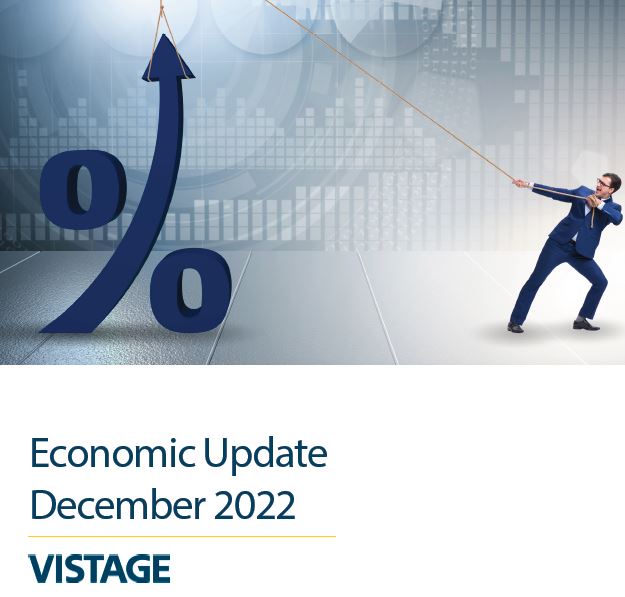“The global economy is transitioning to normal”: our Q4 economic update

Businesses across the UK are in a period of rebuilding and growth. One of the factors that will determine success going forward is great talent.
However, competition for talent is strong. A recent survey reveals that 59.1% of UK businesses are struggling to attract candidates – with 51.8% saying that the battle to attract talent has never been harder.
Three in five workers state, in another survey, that they feel disengaged from their workplace. Over two-thirds want a better work-life balance. At the start of 2022, 29% of UK workers stated that they plan to leave their job in the next 12 months.
The onus is on employers to give their businesses a competitive advantage when it comes to talent management. Here’s how a focus on employee development can help.
Download our full report – Employee Development: The CEO’s Competitive Advantage.
What does employee development look like?
Vistage research reveals that many employers focus their employee development programmes on the front end of the employee lifecycle. The priorities are onboarding and job-specific skills training, as well as KPIs, performance evaluations and feedback/coaching with managers.
Our research has uncovered three key areas which should also be included in employee development programmes for a truly rounded approach.
- Assimilating into organisational culture and values. New employees should not only be trained in their role, but also in how the company operates. It’s vital that they understand the company’s values, mission, vision, purpose and principles. Without coaching on company culture, it can take months to observe and understand.
- Skilling and upskilling. “Hire for fit, train for skill” is a good approach to recruitment. Most companies do include skills training for new starters. However, this needs to be formalised, alongside metrics that determine whether expectations have been met. What’s more, training should include soft skills as well as hard skills to improve results.
3. Personal and professional growth plans. In addition to developing employees for their current role, employers should also make career development clear. New hires should understand where their role could lead and what they need to do to get there. This will both futureproof the business, and aid retention.
It starts from the top…
Business leaders should be able to lead. That’s the assumption that many SMEs make – but the truth is, leadership development is just as important as employee development.
Poor managers can have a significant impact on their teams’ performance, morale and success.
A high-performance team needs a leader who understands each individual, as well as how they can best work together. It needs a leader who can get the team through both the good times and the bad. It needs a leader who can successfully manage both change (such as hybrid working) and different types of people (such as Gen Z and Millennials).
Many businesses don’t prioritise leadership development, as they assume it shouldn’t be needed. The truth is, it is.
What’s more, leadership not only trains existing leaders to be the best they can be, but also helps business owners to understand the leadership potential of their employees.
Measuring success
An employee development programme can have a significant impact on everything from business performance to employee retention. However, for such a programme to succeed, it needs to be accompanied by the right means of assessing its progress and success.
It may be that you need to use a number of assessment types for different purposes. What’s important is that the assessments you use indicate how an individual is progressing, and whether you’re achieving a good return on investment.
The right assessments can provide a scientific basis for employees to understand their strengths and weaknesses, and to build self-awareness. They can also help managers to understand performance at both individual and team level, and where they need to focus efforts to improve.
For employee development and assessment programmes to work, however, each layer of your organisation needs to take accountability for their role in the process. While employees are responsible for their own career pathing, self-guided development and proving their performance, their managers need to take responsibility for providing technical and job-related skills, coaching and mentoring, and performance feedback.
With Vistage membership, you’ll have the support of a team of peers who can help you through all your business challenges. Find out more here.
Your HR team will, of course, have a role to play, including overseeing organisational policies and procedures, and being responsible for performance management.
You, as the business leader, will be responsible for setting development strategy, proving the importance of development across the business and prioritising it as part of your organisation’s culture.
Six questions to ask yourself
Many organisations claim that employee development is important – but it needs to be done right. Building a company culture that’s centred around development, as well as having the right tools, processes and assessments in place, will help your team – including leadership – and your organisation to reach their full potential.
For some businesses, this may require just minor tweaks to what is already being done. For others, it may require a complete overhaul of existing practices, or setting up an employee development programme from scratch.
Companies that commit to employee development demonstrate the value they place on their people, cement their company culture, and have a competitive advantage for both employee recruitment and retention.
To gauge your commitment and refine your approach to employee development, we’ve created a list of six questions which will help CEOs to gauge where they currently are, and what could be improved.
For these six questions, and more detail on creating an effective employee development programme, download our free report: Employee Development: The CEO’s Competitive Advantage.
Category: Business Growth & Strategy
Tags:

